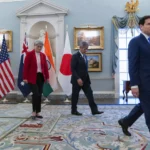
As never before in recent times, economic and political factors have combined, giving each other feedback, to activate all the alarms and configure the open-ended critical juncture that is going through the country. What is at stake is not less: it is whether Sergio Massa manages – even in extremely precarious conditions – to continue playing his role as a firefighter to reach December 10 without everything exploding even more of what has already exploded, or if, on the contrary, the bomba it ends up exploding even during the electoral process, acting like a big bang with multiple immediate consequences. For the candidates, their future and their chances are at stake; for the political regime as a whole, the macabre contradictory game between those who want the dirty work be done now and the danger that the governance of the crisis get out of control; for the great majorities, the most basic of their living conditions, which are increasingly hit.
Let’s review: in recent weeks, to the eternal economic crisis that Sergio Massa set out to lead since last August patching -conejos de la galera by means of-, with more and more doubts and worse results, a deep political combo of overloaded uncertainty was added. To the confusion of peronism -that there are still no clear candidates missing anything for elections – added the internal war within Together for Changefueling the concerns of the country’s own owners. Javier Mileythat television personality that they promoted and used to shift the public debate agenda to the right, is now looked at with more concern. And if in a scenario of so much crisis he enters the ballot? There are not a few important businessmen who think that the country is not for adventures.
The “self-fulfilling prophecy” was then installed as an intense debate in the corridors of the red circle in recent days. As in a game of mirrors, the dismal economic results of the IMF plan applied by the Frente de Todos -the last of them an inflation of 7.7% in March-, are matched by shock agendas said in an increasingly unbridled manner by different candidates who are parading through business forums and television channels at this time. From the agitation of dollarization that the libertarian candidate installed, to those who propose to lift the exchange rate and devalue the first day of the next Government, there are factors that end up acting not as propaganda towards the future, but rather that affect the already great devaluatory pressures that exist in the present. In other words: the chances of electoral victory for those who raise such perspectives are not exactly a kind invitation to stay in pesos. As frequently happens in Argentine electoral years, the temptations to dollarize portfolios grow. The big businessmen -beginning with the employers of the countryside and others- play financial scams and speculate with the hunger of millions. There is no point in forecasting the future, when we still don’t even know the end of the current currency run. But it is not the only accident that could be in the year. What could happen after the STEP? Uncertainty is the only thing that is certain.
In this context -which has at its core the Central Bank’s reserve crisis, the contradictory effects of measures such as the “soybean dollar” that raise dollars but demand pesos, the deep dependence on the IMF and the debt, the constant flight of capital and other factors – a spark can ignite the prairie. This Tuesday, the rumors that Sergio Massa could be replaced in his position by Antonio Aracre gave another push to the exchange rate run. But let’s be clear: a rumor can only have that effect if it acts on the basis of an extremely fragile situation.
In this context, and while the urgencies of the present are pressing, the Argentine bourgeoisie open-air debate on their war plans. If it were a play, we could say that two stories take place in parallel, that are narrated interspersed and intersect in the middle. On the one hand, the one in which the characters, in permanent round trips from the United States to Argentina and vice versa, negotiate the country’s emergencies. On the other hand, that of those who are emerging as possible winners of the electoral process and are taking an examination before the owners of power in successive forums.
If the role of containment of Kirchnerism was not acting in our country -although in an increasingly degraded way-, it is possible that today they were talking more openly about carnal relations like in the 90s. Faced with the submission and support of those who used to say national and popular to the plans of Massa and the IMF, the left is the only clear and clear voice to say so.
In the last few days, the show was obscene. It is not only what many are already trying to naturalize, that is, that the Government has to take quarterly exams before the Fund, bow its head to accept the supervision of the economic plan – now begging for a “bridge” to try to reach December 10 without having to make a sudden devaluation- and return with suitcases full of new adjustment plans, all to honor the illegal debt that Mauricio Macri took and the current government validates. It is also about the less and less concealed presence of the empire’s envoys in Argentina. In the last few hours, Wendy Sherman, US Deputy Secretary of State who was in our country, did not even bother to keep the forms to ask for harsher adjustments. Of course, promising that everything is for our good and to improve, affirming that the country can move forward “if the citizens bear the pain in the short term to put Argentina on a solid economic footing that opens the door for investors in a meaningful way.” A few days later, he was also in these latitudes Laura Jane Richardson, Chief of the Southern Command of the United States -who had already met with Cristina Kirchner last year-. In their meetings with Foreign Minister Jorge Taiana and Army Chief Martín Paleo they discussed “cooperation strategies in areas of common interest.” We already know what that means: a few months ago the US military had spoken that the region was important the “national security” of the United States, among other things, for its natural resources such as lithium. One of the least mentioned counterparts of the negotiations with the IMF is that which has to do with the demands of geopolitical alignments, looting and extractivism. Around these same hours, the United States also left on end against Brazil for gestures towards Russia and China. The Argentine panorama can only be seen from the broader prism of world geopolitics and disputes between powers. In this framework, the acceptance of the illegal debt with the IMF does nothing more than redouble the dependency and semi-colonization of Argentina. The Front of All is in full delivery mode in order to get to December. And, what is worse, it can fail.
In parallel, who have the advantage if they do not govern today, they render examination before the powerful of the country. The ruling classes are in a state of boiling and debate, asking them not only for a program in the face of the crisis but also for a as do it, a strategy governance. In expressions such as “dynamite” everything (Milei), “semi-dynamite” (Macri) or “demolish the economic regime” (Bullrich), there may be a demagogic electoral dispute over the capitalization of discontent on the right, but from there to governing is another issue. In the meetings that have taken place in the headquarters of the Rural Society or the exclusive Llao Llao hotel in Bariloche in recent days, these contradictions have been present. While Milei, with dollarization as a banner, and Patricia Bullrich, talking about lifting the exchange rate clamp from day one among other frontal attacks, seek to postulate themselves as the toughest implementers of a change, Larreta seeks to exploit the concerns of the bourgeoisie by exploring a diagonal: profound change? Yes, but not with “bravado” but by building “a new majority to bring about real and lasting change.”
However, none of this allays the concerns of the ruling classes. Between now and December 10 there is a lot of uncertain ground to cover and the new exchange rate run and devaluation pressures are putting pressure on the whole situation. After that date, another story will also start, and It is not clear at all that the words that are said in the forums can have their correlate in the field of facts. The divisions of those above combined with the workers who cut the Pan-American highway, the subway workers who fight their working conditions, those of Bagley in Córdoba who stand up against dismissals or the teachers of Jujuy who recovered their union for their struggles , they may be anticipating that the plans of the different sectors of the ruling classes may crash -sooner rather than later- against the resistance of those below. The situation is so worrying that even the CGT – after having visited the Yankee embassy last Friday – is preparing a document to warn how close we are to the abyss. To call a general strike and fight plan, no way. The rupture of their complicit passivity must be imposed from below.
Given this scenario, the left proposes to be part of the fight for stand up the working class in the face of the catastrophe that threatens us, promote and coordinate each of their struggles, impose the end of the truce on the union bureaucracies to go out and fight for what is ours, and offer an exit program to turn history around. For that, this May 1st, the left will plant a platform with thousands in Plaza de Mayo. We will present this perspective.
Source: www.laizquierdadiario.com

